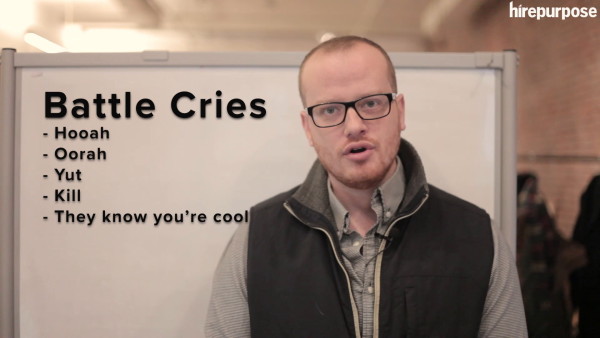

Companies
make a big stink out of their efforts to employ U.S. service members who are transitioning out of military service, but veterans still face a major obstacle when it comes to the actual hiring process: they’re seen as unemotional, unfeeling, and lacking in interpersonal skills — and that screws them over when it come to certain jobs.
New research from Duke University’s Fuqua School of Business, based on experiments involving more than 3,000 participants and published in the journal Organizational Behavior and Human Decision Process, indicates that veteran job candidates are widely seen as possessing a “calm under pressure and having a get-it-done kind of attitude,” according to lead researcher
Aaron Kay.
But while those traits are normally appealing, Kay said that the changing nature of the U.S. economy means that many new jobs “many new types of jobs also require creativity, interpersonal skills and emotional capacity” — traits that civilians assume military veterans fundamentally lack.
As a result, civilian hiring managers surveyed as part of the research “showed a tendency to relegate veteran job candidates to roles where they would be working with things rather than people,” as the Fuqua release
put it.
“This bias was occurring among actual managers who are in the business of hiring people,” Kay
said in the release. “In one of the studies, we tested this in a large American restaurant chain. As these managers were evaluating applicants’ resumes, their choices showed they thought veterans were more suited to the kitchen as opposed to jobs where they would be dealing with people.”
“Importantly, veterans were not liked less,” he added. “Managers just thought the kitchen is where they would thrive.”
Naturally, veteran service organizations and other advocates find their experiences run counter to the study’s conclusions.
“It’s a bit short-sighted to say, ‘We don’t want service members to be customer-facing,'” Tom Kastner, an Army veteran and vice president of financial wellness at the Wounded Warrior Project, told Task & Purpose in a phone interview. “There are members of the military who are more than ready to do that, people who work well in operational leadership roles.”
“Look, after 30 years in the Army, I had a degree, plenty of experience, and no combat experience … I didn’t bring anything like that with me,” he added. “I walked into a for-profit company that didn’t have any veterans of any veteran programming … it can be shell shock.”
According to Kastner, one major issue with the Fuqua study’s conclusion is partly methodological: it doesn’t appear to thread the perspectives of potential employers with the the real-life experiences of the veterans they’ve actually hired.
“With the publicity in recent years about PTSD and veterans suicide, there’s a broad expectation that there’s more of a chance that a military member will bring their baggage with them when they apply for a job,” he said. “I don’t know if that’s fair or unfair, but it’s all examined from the employer’s side … there’s no indication that they studied indicators from the military at all.”
But beyond the Fuqua study itself, Kastner argues that the issue employers encounter is often a general mismatch between employer and candidate rather than an explicit issue stemming from a veteran’s military experience.
“In our experience, we try to work with warriors to discover where individuals are in their journey from wearing a uniform to getting a good job,” said Kastner of WWP’s career counseling program. “You have to do a lot of individual study with a warrior to figure out what job’s they’re qualified for, which employers have voiced an interest in hiring veterans and, more importantly, which ones have actually made adjustments within their HR departments or within the culture of the business knowing that it could be a foreign entry point for veterans.”
“We make sure we’re not forcing a service member toward an opportunity that doesn’t have some promise of success,” he added.
It’s not as though major U.S. companies are avoiding hiring veterans. Amazon, JP Morgan, and Starbucks have all publicly touted their hiring efforts in recent years; The Walt Disney Company even runs an annual veterans institute with USAA that imparts a veterans hiring program curriculum to smaller companies.
But just as commanding officers make the daily decisions in the U.S. armed forces, so do hiring managers at civilian companies — and according to the Fuqua study, too many hiring managers still think of veterans like children: better seen and not heard.
“It’s just not an accurate way to approach things,” Kastner said. “The individuals credentials, their resume … we have to let the interview itself say something about them. You have to get to know a person before you can jump to these kinds of conclusions. Every company should hire based on the competitiveness of the company … don’t automatically disqualify a military member based on a preconceived notion.”
